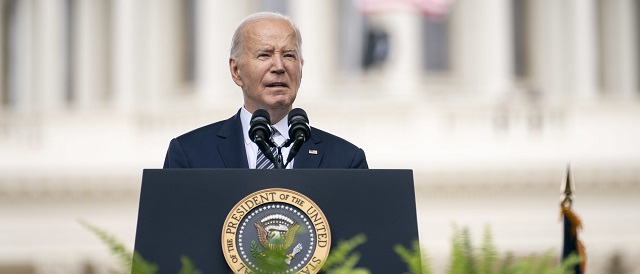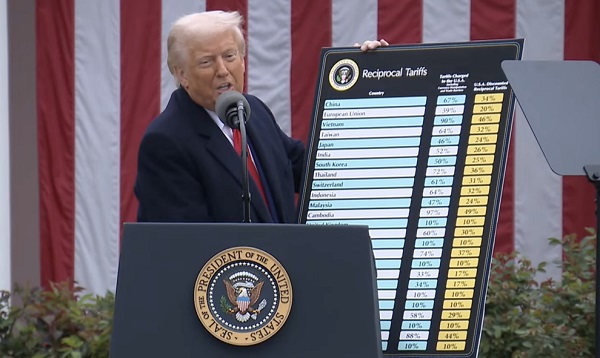International
Colonel Macgregor: Biden’s cognitive decline makes it obvious the US gov’t is in ‘unelected hands’

From LifeSiteNews
Macgregor criticized the Biden administration for facilitating mass illegal immigration, destructive climate change policies, and the waging of foreign wars in Ukraine and Israel.
Retired U.S. Army Colonel Douglas Macgregor has said that “the governing power” of the U.S. lies “in unelected hands” after the first presidential debate highlighting President Joe Biden’s cognitive decline to the whole world.
In a video message published on the YouTube channel Our Country Our Choice, MacGregor expressed his concern for the U.S. after Biden’s catastrophic showing in the first presidential debate on June 27.
“President Biden is not fit to discharge the immense duties of the presidency,” the army veteran stated. “The alarming evidence of his cognitive decline was on display for all to witness. Yet his enablers and political allies continue to exploit the president to substitute their destructive agenda for the interests of the American people.”
“Destructive executive orders and policy directives, many of which were likely signed when President Biden was in a rapidly diminished state of mind, inflicted tremendous damage on our nation,” he said.
Macgregor criticized the Biden administration for facilitating mass illegal immigration, destructive climate change policies, and the waging of foreign wars in Ukraine and Israel.
“President Biden’s manipulators fueled a proxy war in Ukraine that risks drawing us into a catastrophic confrontation with nuclear-armed Russia,” the retired Colonel said. “Their unqualified support for Israel’s disproportionate actions in Gaza erodes our moral authority and credibility as a champion of peace and stability.”
“Sadly, President Biden’s fragile mental state was laid bare for all to see in last night’s debate,” he observed. “His responses were frequently incoherent. He appeared lost, even confused, struggling to complete basic thoughts.”
“It is time to ask: who truly governs this country?” Macgregor said. “Is it we the people, as our founders intended, or have we surrendered control to unelected bureaucrats, sprawling federal agencies, and affluent donors who do not have the best interests of ordinary Americans at heart?”
“President Biden should retire with grace and dignity and not be cruelly exploited in the twilight of his life,” the Colonel noted.
“To say it’s a national shame is an understatement,” he added. “This travesty should end immediately. It is now obvious that the governing power to determine our nation’s destiny lies in unelected hands.”
“It’s time for Americans to demand a new government that is legitimate. One that is devoted to peace abroad and prosperity at home,” Macgregor concluded.
Democrats and Republicans alike acknowledged Biden’s poor performance in the debate less than five months before the 2024 presidential elections. A CNN anchor said, “Democrats I’m talking to are nearly beside themselves.”
The 81-year-old Joe Biden appeared noticeably disoriented during the debate, generating anxiety among Democrats and sparking renewed speculation about potential plans to replace him with a more viable candidate.
Energy
Trump Takes More Action To Get Government Out Of LNG’s Way


From the Daily Caller News Foundation
By David Blackmon
The Trump administration moved this week to eliminate another Biden-era artificial roadblock to energy infrastructure development which is both unneeded and counterproductive to U.S. energy security.
In April 2023, Biden’s Department of Energy, under the hyper-politicized leadership of Secretary Jennifer Granholm, implemented a new policy requiring LNG projects to begin exports within seven years of receiving federal approval. Granholm somewhat hilariously claimed the policy was aimed at ensuring timely development and aligning with climate goals by preventing indefinite delays in energy projects that could impact emissions targets.
This claim was rendered incredibly specious just 8 months later, when Granholm aligned with then-President Joe Biden’s “pause” in permitting for new LNG projects due to absurd fears such exports might actually create higher emissions than coal-fired power plants. The draft study that served as the basis for the pause was thoroughly debunked within a few months, yet Granholm and the White House steadfastly maintained their ruse for a full year until Donald Trump took office on Jan. 20 and reversed Biden’s order.
Certainly, any company involved in the development of a major LNG export project wants to proceed to first cargoes as expeditiously as possible. After all, the sooner a project starts generating revenues, the more rapid the payout becomes, and the higher the returns on investments. That’s the whole goal of entering this high-growth industry. Just as obviously, unforeseen delays in the development process can lead to big cost overruns that are the bane of any major infrastructure project.
On the other hand, these are highly complex, capital-intensive projects that are subject to all sorts of delay factors. As developers experienced in recent years, disruptions in supply chains caused by factors related to the COVID-19 pandemic resulted in major delays and cost overruns in projects in every facet of the economy.
Developers in the LNG industry have argued that this arbitrary timeline was too restrictive, citing these and other factors that can extend beyond seven years. Trump, responding to these concerns and his campaign promises to bolster American energy dominance, moved swiftly to eliminate this requirement. On Tuesday, Reuters reported that the U.S. was set to rescind this policy, freeing LNG projects from the rigid timeline and potentially accelerating their completion.
This policy reversal could signal a broader approach to infrastructure under Trump. The Infrastructure Investment and Jobs Act, enacted in 2021, allocated $1.2 trillion to rebuild roads, bridges, broadband and other critical systems, with funds intended to be awarded over five years, though some projects naturally extend beyond that due to construction timelines. The seven-year LNG deadline was a specific energy-related constraint, but Trump’s administration has shown a willingness to pause or redirect Biden-era infrastructure funding more generally. For instance, Trump’s Jan.20 executive order, “Unleashing American Energy,” directed agencies to halt disbursements under the IIJA and IRA pending a 90-day review, raising questions about whether similar time-bound restrictions across infrastructure sectors might also be loosened or eliminated.
Critics argue that scrapping deadlines risks stalling projects indefinitely, undermining the urgency Biden sought to instill in modernizing U.S. infrastructure. Supporters argue that developers already have every profit-motivated incentive to proceed as rapidly as possible and see the elimination of this restriction as a pragmatic adjustment, allowing flexibility for states and private entities to navigate permitting, labor shortages and supply chain issues—challenges that have persisted into 2025.
For example, the $294 billion in unawarded IIJA funds, including $87.2 billion in competitive grants, now fall under Trump’s purview, and his more energy-focused administration could prioritize projects aligned with his energy and economic goals over Biden’s climate and DEI-focused initiatives.
Ultimately, Trump’s decision to end the seven-year LNG deadline exemplifies his intent to reshape infrastructure policy by prioritizing speed, flexibility and industry needs. Whether this extends formally to all U.S. infrastructure projects remains unclear, but seems likely given the Trump White House’s stated objectives and priorities.
This move also clearly aligns with the overall Trump philosophy of getting the government out of the way, allowing the markets to work and freeing the business community to restore American Energy Dominance in the most expeditious way possible.
David Blackmon is an energy writer and consultant based in Texas. He spent 40 years in the oil and gas business, where he specialized in public policy and communications.
Automotive
Auto giant shuts down foreign plants as Trump moves to protect U.S. industry

 MxM News
MxM News
Quick Hit:
Stellantis is pausing vehicle production at two North American facilities—one in Canada and another in Mexico—following President Donald Trump’s announcement of 25% tariffs on foreign-made cars. The move marks one of the first corporate responses to the administration’s push to bring back American manufacturing.
Key Details:
-
In an email to workers Thursday, Stellantis North America chief Antonio Filosa directly tied the production pause to the new tariffs, writing that the company is “continuing to assess the medium- and long-term effects” but is “temporarily pausing production” at select assembly plants outside the U.S.
-
Production at the Windsor Assembly Plant in Ontario will be paused for two weeks, while the Toluca Assembly Plant in Mexico will be offline for the entire month of April.
-
These plants produce the Chrysler Pacifica minivan, the new Dodge Charger Daytona EV, the Jeep Compass SUV, and the Jeep Wagoneer S EV.
Diving Deeper:
On Wednesday afternoon in the White House Rose Garden, President Trump announced sweeping new tariffs aimed at revitalizing America’s auto manufacturing industry. The 25% tariffs on all imported cars are part of a broader “reciprocal tariffs” strategy, which Trump described as ending decades of globalist trade policies that hollowed out U.S. industry.
Just a day later, Stellantis became the first major automaker to act on the new policy, halting production at two of its international plants. According to an internal email obtained by CNBC, Stellantis North American COO Antonio Filosa said the company is “taking immediate actions” to respond to the tariff policy while continuing to evaluate the broader impact.
“These actions will impact some employees at several of our U.S. powertrain and stamping facilities that support those operations,” Filosa wrote.
The Windsor, Ontario plant, which builds the Chrysler Pacifica and the newly introduced Dodge Charger Daytona EV, will shut down for two weeks. The Toluca facility in Mexico, responsible for the Jeep Compass and Jeep Wagoneer S EV, will suspend operations for the entire month of April.
The move comes as Stellantis continues to face scrutiny for its reliance on low-wage labor in foreign markets. As reported by Breitbart News, the company has spent years shifting production and engineering jobs to countries like Brazil, India, Morocco, and Mexico—often at the expense of American workers. Last year alone, Stellantis cut around 400 U.S.-based engineering positions while ramping up operations overseas.
Meanwhile, General Motors appears to be responding differently. According to Reuters, GM told employees in a webcast Thursday that it will increase production of light-duty trucks at its Fort Wayne, Indiana plant—where it builds the Chevrolet Silverado and GMC Sierra. These models are also assembled in Mexico and Canada, but GM’s decision suggests a shift in production to the U.S. could be underway in light of the tariffs.
As Trump’s trade reset takes effect, more automakers are expected to recalibrate their production strategies—potentially signaling a long-awaited shift away from offshoring and toward rebuilding American industry.
-

 Catherine Herridge2 days ago
Catherine Herridge2 days agoFBI imposed Hunter Biden laptop ‘gag order’ after employee accidentally confirmed authenticity: report
-

 Canadian Energy Centre1 day ago
Canadian Energy Centre1 day agoSaskatchewan Indigenous leaders urging need for access to natural gas
-

 Business1 day ago
Business1 day agoB.C. Credit Downgrade Signals Deepening Fiscal Trouble
-

 Business2 days ago
Business2 days agoTrump orders 10% baseline tariff on imports, closes de minimis loophole
-

 2025 Federal Election1 day ago
2025 Federal Election1 day agoHighly touted policies the Liberal government didn’t actually implement
-

 COVID-191 day ago
COVID-191 day agoTrump’s new NIH head fires top Fauci allies and COVID shot promoters, including Fauci’s wife
-

 Business2 days ago
Business2 days agoCalifornia planning to double film tax credits amid industry decline
-

 Courageous Discourse1 day ago
Courageous Discourse1 day agoEurope Had 127,350 Cases of Measles in 2024





